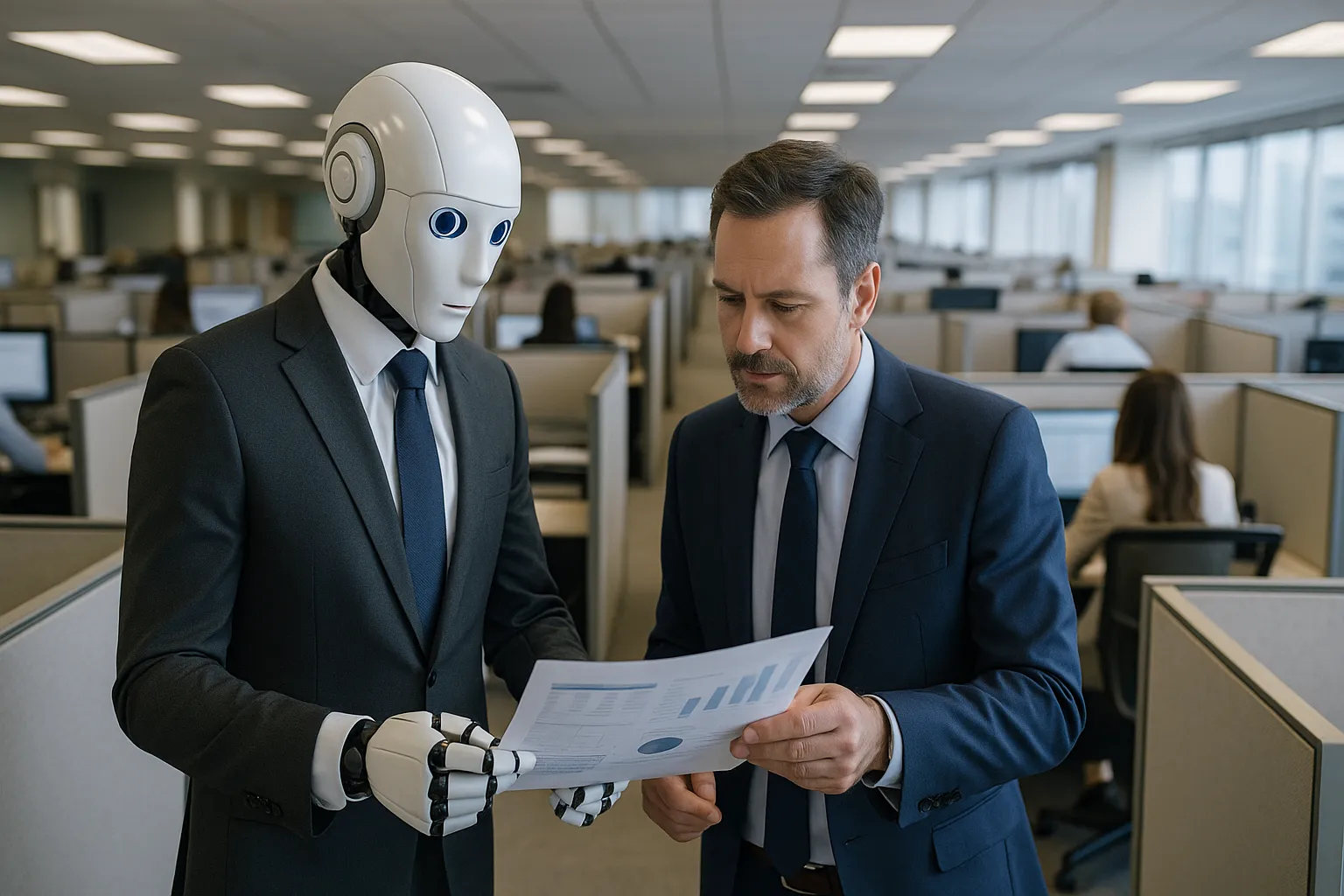Forget Entry Level Jobs - A.I. Is Climbing the Corporate Ladder

Image generated by OpenAI’s DALL·E, via ChatGPT

Image generated by OpenAI’s DALL·E, via ChatGPT
We’ve heard plenty of panic about AI taking creative jobs. Writers, designers and even musicians have been bracing for impact. White-collar workers, especially those whose talents are expressive or generative, have seen the warning signs — and the headlines — loud and clear.
But the group that should be sweating the most? Middle managers. And most of them haven’t even looked up from their meeting invites long enough to notice.
Not because AI is going to eliminate all middle management — but because it’s going to create a brutal divide between the managers who figure out how to work with AI, and those who don’t.
That’s not just a provocative jab at corporate bureaucracy. It’s a data-backed, pattern-recognized forecast. If you’ve spent any time watching how AI is being adopted across industries, the writing is on the digital whiteboard. The most efficient, AI-literate managers are about to manage more people, more projects and more workflows. The rest will be quietly phased out.
Management, especially the middle layer of it, is increasingly about coordination, delegation, documentation, reporting, approvals and status updates — precisely the sort of tasks large language models, workflow bots and AI assistants are already excellent at replicating, and in many cases, improving.
Let’s be clear: Not all managers are in trouble. The ones who lead with vision, develop talent, build culture and resolve conflict are doing the kind of work AI still struggles with — relational, human, deeply contextual. But that’s not what most middle managers are paid for.
A 2023 McKinsey report on middle management productivity found that middle managers spend nearly half their time on nonmanagerial tasks — things like administrative busywork and individual contributor assignments — while devoting less than a third of their time to people management. Worse, they’re spending less than a quarter of their time on strategy, despite identifying it as one of the areas where they deliver the most value. In many cases, they’re not being mismanaged — they’re being misused. And the misalignment between what they’re doing and what they should be doing is exactly where AI-powered managers will pull ahead.
Already, tools like Microsoft 365 Copilot, Slack GPT and Notion AI are quietly absorbing many of the managerial rituals that once required a human: writing recaps, summarizing meetings, assigning tasks, tracking OKRs and pinging team members for updates. With a few more integrations, it’s easy to imagine a future where that entire Monday standup is replaced by an asynchronous report assembled by a machine and reviewed by one manager — not four.
And here’s where the change gets real: the manager who understands how to build, train and trust that AI system becomes more efficient. More scalable. More valuable. They can take on two teams instead of one. Or launch a new initiative without hiring another lead. They’re not being replaced by AI — they’re being amplified by it.
Meanwhile, their peers who resist these tools — out of fear, pride or inertia — fall behind. Not because they’re bad at their jobs, but because they’re suddenly doing less with more. Their performance metrics slip. Their teams grow frustrated. Their promotions stall. Eventually, their role starts to look redundant. Not to the algorithm — but to the organization.
So let’s stop saying that AI is going to replace middle managers. It’s not. But managers who use AI are going to replace the ones who don’t.
This dynamic raises an uncomfortable question for companies: What happens when the people leading your AI rollout don’t realize they’re automating themselves out of a job? Many middle managers are the ones evaluating and approving these tools — without recognizing that they’re slowly rendering layers of their own role obsolete.
To be fair, not every manager will be cut. Just as factory foremen adapted to automation on the floor, many will adapt to managing AI-driven workflows. But if we don’t start being honest about who benefits and who gets squeezed, we’ll miss the opportunity to reimagine management — instead of just downsizing it.
AI isn’t here to flatten the org chart. It’s here to reshape it. And the ones left standing will be those who knew how to feed the machine — not fight it.